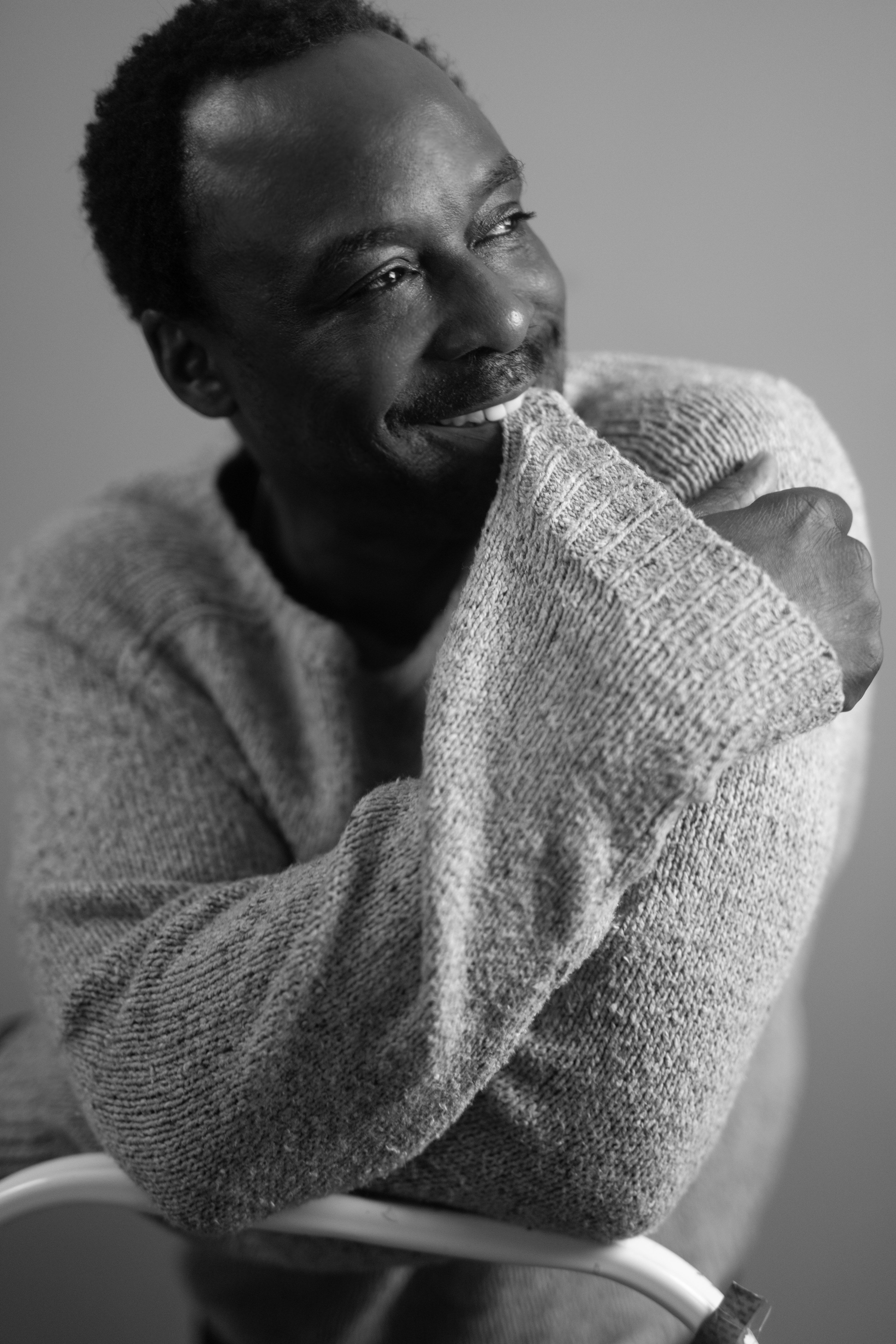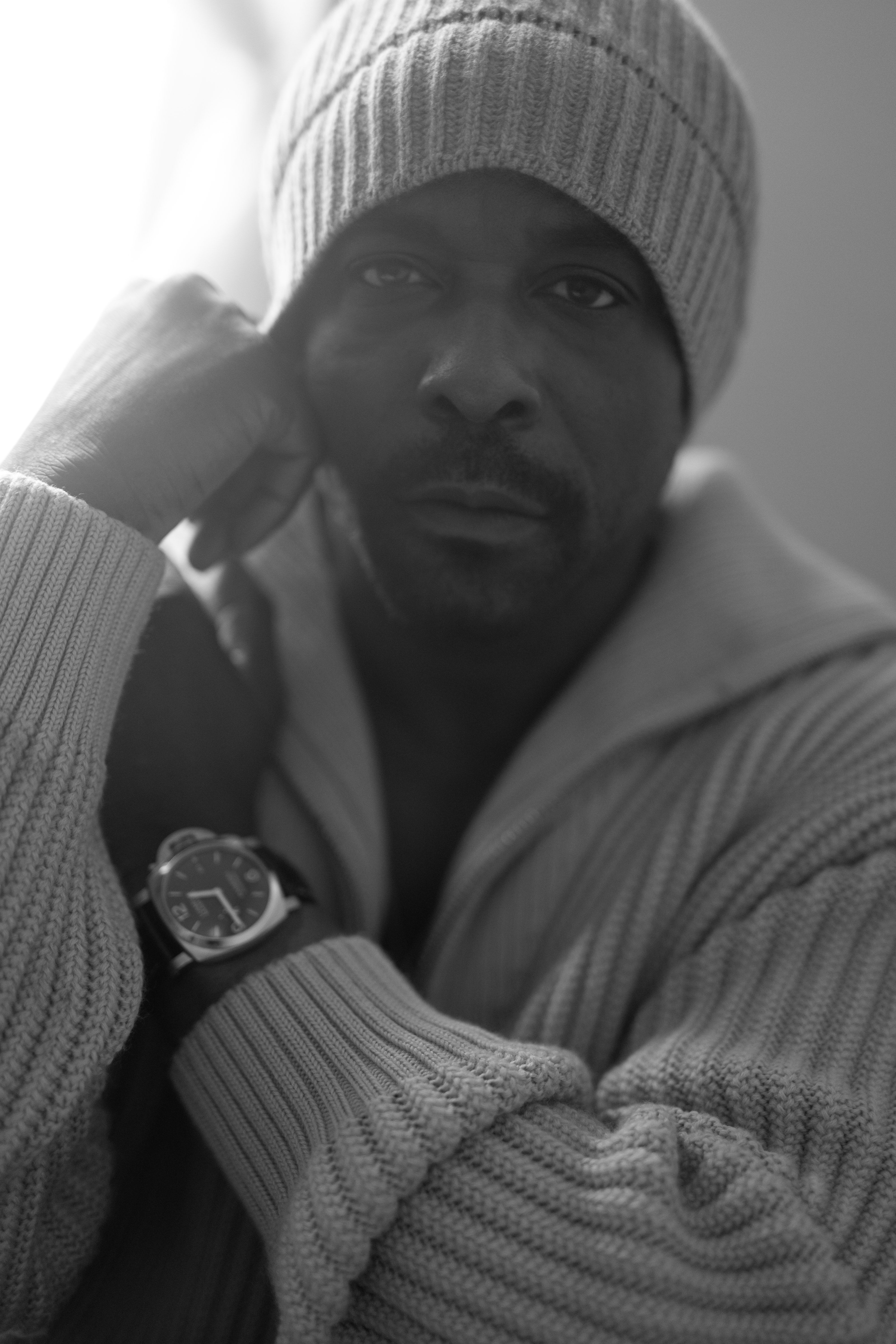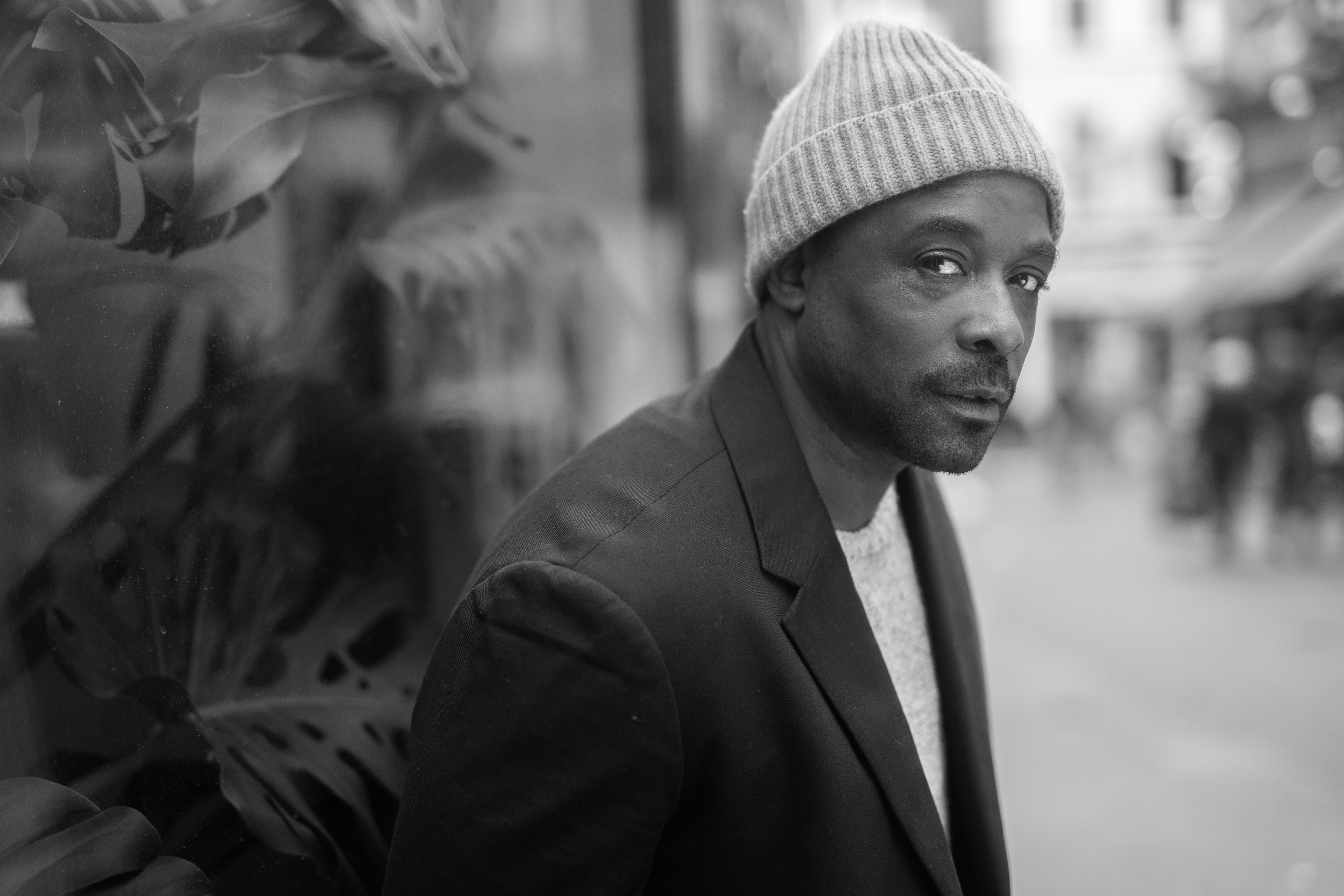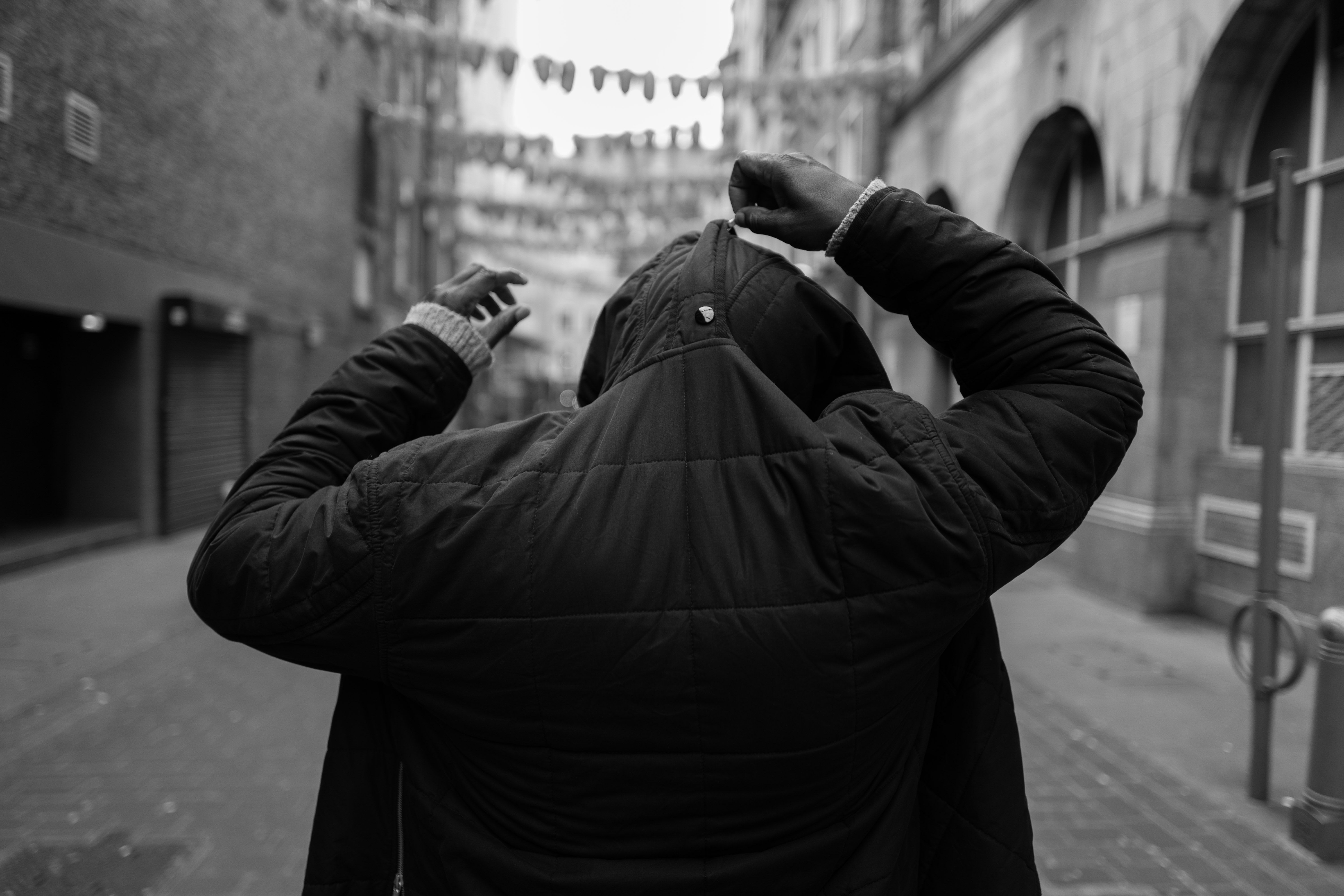
The British actor Ariyon Bakare has a long career of bringing a unique kind of intensity to both stage and screen. Whether he is in front of camera expressing the understated menace of a parallel universe-hopping malcontent, such as Lord Boreal in His Dark Materials, or on stage capturing the revolutionary fervour of Martin Luther King in Mountaintop, his passion for his craft and visceral talent are almost palpable. He can currently be seen as off-kilter bomb-enthusiast and environmental activist Richard Beaumont in the Apple TV+ re-imagining of Paul Theroux’s brilliant Mosquito Coast, which documents one man’s quest to remove his family from a capitalist society he believes to be cheap, corrupt and oppressive to the human spirit. It’s a typically interesting choice of role for an actor who has resolutely carved out his own destiny, striking out for his dream of being a dancer in his late-teens by heading to the Big Apple to study at a number of leading conservatoires, before heading home to throw himself headlong into acting – notably cutting his teeth at The Royal Shakespeare Company. It’s been a personal journey of considerable highs and lows, taking into its sway homelessness, bereavement, overcoming self-doubt and positive activism, all of which is, of course, grist to the mill. Here, the actor recalls some of the more difficult moments that have shaped him, discusses the art of inhabiting a character, and tells us why his greatest achievement is rediscovering love.
Can you recall what first drew you to the world of acting …
When I was a kid my dad bought me a book of Shakespeare, but just the stories. I read it and can distinctly remember crying at the end. I was really young, probably only about eight. I then said to my dad, I wanted to read the actual plays. He had this old book that he had bought with him from Nigeria of the complete works. I read everything. I didn't understand what was going on, but I just read it. And I had this emotional connection. I have always seemed to be able to connect with plays more than I do novels. I was always drawn to them. In a novel you get a slice of someone's life from one perspective, whereas a play gives you a moment in time and portrays how everyone deals with that moment from their own viewpoint – everyone has their input. I think that is why I tend to love films that contain lots of different stories happening at the same time.

You had a difficult relationship with your father later on …
Yes. I was talking about that with someone recently. Everyone always think that people are homeless because you come from a bad family or something, or some really terrible thing had happened. Mine was more that my father and I had an argument when I was a teenager, and I left. I was physically homeless for four months, and then I went to live in a hostel, where I met some amazing characters. I actually had a really long conversation with my dad about this just last week. And I explained to him how hard it was at the time. It was such a difficult time for me, but I would never change it. It's really important as part of my blueprint of myself. It taught me resilience, and that whatever hard times I am in, I will always get over them. This too shall pass. That's my favourite motto: this too shall pass. I know now that sadness never lasts for that long. I've had a dense life – a life full of trauma, full of lightness, and full of adventure.
I guess that sense of adventure is what drew you to head for New York as a young man?
The Alan Parker film Fame is probably the reason I left for New York as a kid. It is brilliant. People still don't realise just how good that film actually is. It just really got the heart of young artists. New York was was totally different back then. There was so much you could get from it. You could meet so many great people at that time. Martha Graham was still there, and there were all these great dancers that I could go and do classes with – all these great people at my fingertips. It had this frisson of danger about it, but you could be kind of excited by that danger at the same time. As I was leaving, Giuliani became the mayor and you could see him clearing it up – the vibe of New York lost its edge really quickly.

There’s a frisson of danger in your character in Mosquito Coast too, what made you want to play an environmental activist?
I really wanted to get into that mind-set, and I was intrigued about playing an environmentalist. I believe that what we are supposed to do as artists is seek out the extremes in ourselves. We’re supposed to mirror society, but also kind of educate society, and affect the culture. That's what I'm always looking for. I'm looking for those parts that of kind of make you see things in a different way. I wanted to explore and understand this guy who was really wealthy, and had everything, but has kind of realised that he's now got to give back. And I think if I got to that certain point in life, I’d also have to give back, I’d also have to educate, and do something to change people’s ideas. I understood him from that point of view. He takes it all too far, but he’s basically driven by passion.
What do you think Mosquito Coast says about American society?
Rather than American society, I would say global capitalism. I would say it reflects the fact that we're losing our way, and it's really upsetting. I mean, we’ve made the world get smaller, and that’s a good thing in terms of communicating with people, but, at the same time, we seem to want to guard our own gardens, and put all these fences up. And if you think about the rich, they’re getting exceptionally richer, and the poor are now exceptionally poor. But I do think that out of this this moment we're in now, there's going to be something that springs out from art that is going to trigger us to realise we are all flesh and blood, and that we’ve all got to look after each other.
Was it that kind of drive that inspired you to start your own platform to bring people together in the wake of George Floyd…
Yeah. I had this thing called I Care, which was about starting a conversation about racial equality. I wanted to talk about it from the point of view of positivity. I wanted people to move forward with it, and look at how can we change it. I'm always about change. And that’s because that's what my life has been like. My life was always about overcoming. It's easy to change. You’ve just got to believe it in your mind. It’s all about being open. It’s all about talking about what you're really experiencing, because if we don't talk about where we are at, if we don't talk about our pain, then no one knows it’s there. So, I created this website and started asking people to tell me what they felt. It became this big thing where people started wanting to put videos on there, and people were like really pushing me to be kind of take it further, but I was like, well, you know, I need to get back to work!
In terms of your work, I’ve read that you tend to research your roles pretty heavily …
Yeah. That's my brain. I love the research. I like looking into things. I like going deeper. I think it can be quite intimidating for directors when I turn up with my arms full of books. In theatre, one of my favourite performances I've ever done was playing Martin Luther King in Mountaintop. That was a big undertaking for me. I wanted to get it right. I wanted it to be perfect, and to get close to that I got into so, so much research. It’s also about finding extremes in physical expression. When I played Stephen Black in Jonathan Strange, for example, I had this idea in my head about a slave never having a voice, so the whole performance was about being as quiet as possible, to the point that people always had to come in closer. Some of the intensity of that performance came from something that I was going through the time. Everything was going really badly that year for me. I lost my mum, I lost my sister, and I lost my home, and I was sort of afraid of being homeless again. I felt very lost.

It sounds like another very difficult period …
It was. It felt like a dream. I was going through a kind of bereavement for the breakup of my relationship anyway, and then, within weeks, my sister died. Then my stepmother died six weeks later. It was the lowest part of my life. It broke me. I just felt as if I was in a long cycle on the washing machine, and I didn't know what I was going to come out like. I've had so many different parts of my life – I've had the homelessness, I've had the success. But then there was this third moment in my life where everything just took its toll. I didn't know if I could go through anything more. In the end, I just was like, okay, the best thing to do is just accept everything, and that’s what I did. I sat with acceptance. I started writing. I started taking photographs to keep myself creative. And that's when the world started to change. And I realised I was more resilient than I think.
What do you think is your greatest achievement to date?
My greatest achievement … Actually, I’m going to say that it is getting to an age where I can look at my father as my friend, and get to that point where I love my father. Last week, we had a very long talk and he apologised for the past, and I just went, don't apologise, I love you. And that was a big thing for me. I'm so lucky to be able to say that to my dad. He brought me and my sister up on his own in the 1970s – a black man trying to study, trying to raise kids, and trying to do everything. Now, I can see that he was just a man, and that he tried his best. I can understand his pain, and the fact that when my mum left him with two children, he was heartbroken, and that he was also feeling the loss and numbness that we both were. It's taken me so long, but last week … Yeah… It’s the greatest achievement in my life.
Mosquito Coast is streaming on Apple TV+
Potraits of Aryion Bakare by Joseph Lynn